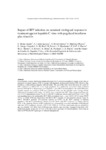Impact of HIV infection on sustained virological response to treatment against hepatitis C virus with pegylated interferon plus ribavirin

Ver/
Use este enlace para citar
http://hdl.handle.net/2183/18388Coleccións
- INIBIC-VC - Artigos [37]
Metadatos
Mostrar o rexistro completo do ítemTítulo
Impact of HIV infection on sustained virological response to treatment against hepatitis C virus with pegylated interferon plus ribavirinAutor(es)
Data
2015-07-09Cita bibliográfica
Monje-Agudo P, Castro-Iglesias A, Rivero-Juárez A, et al. Impact of HIV infection on sustained virological response to treatment against hepatitis C virus with pegylated interferon plus ribavirin. Eur J Clin Microbiol Infect Dis. 2015;34(10):1929-36
Resumo
[Abstract] It is commonly accepted that human immunodeficiency (HIV) coinfection negatively impacts on the rates of sustained virological response (SVR) to therapy with pegylated interferon plus ribavirin (PR). However, this hypothesis is derived from comparing different studies. The aim of this study was to determine the impact of HIV coinfection on SVR to PR in one single population. In a multicentric, prospective study conducted between 2000 and 2013, all previously naïve hepatitis C virus (HCV)-infected patients who started PR in five Spanish hospitals were analyzed. SVR was evaluated 24 weeks after the scheduled end of therapy. Of the 1046 patients included in this study, 413 (39 %) were coinfected with HIV. Three hundred and forty-one (54 %) HCV-monoinfected versus 174 (42 %) HIV/HCV-coinfected patients achieved SVR (p < 0.001). The corresponding figures for undetectable HCV RNA at treatment week 4 were 86/181 (47 %) versus 59/197 (30 %), p < 0.001. SVR was observed in 149 (69 %) HCV genotype 2/3-monoinfected subjects versus 91 (68 %) HIV/HCV genotype 2/3-coinfected subjects (p = 0.785). In the HCV genotype 1/4-infected population, 188 (46 %) monoinfected patients versus 82 (30 %) with HIV coinfection (p < 0.001) achieved SVR. In this subgroup, absence of HIV coinfection was independently associated with higher SVR [adjusted odds ratio (95 % confidence interval): 2.127 (1.135–3.988); p = 0.019] in a multivariate analysis adjusted for age, sex, baseline HCV RNA load, IL28B genotype, fibrosis stage, and type of pegylated interferon. HIV coinfection impacts on the rates of SVR to PR only in HCV genotype 1/4-infected patients, while it has no effect on SVR in the HCV genotype 2/3-infected subpopulation.
Versión do editor
Dereitos
The final publication is avaliable at Springer Link
ISSN
0934-9723
1435-4373
1435-4373





